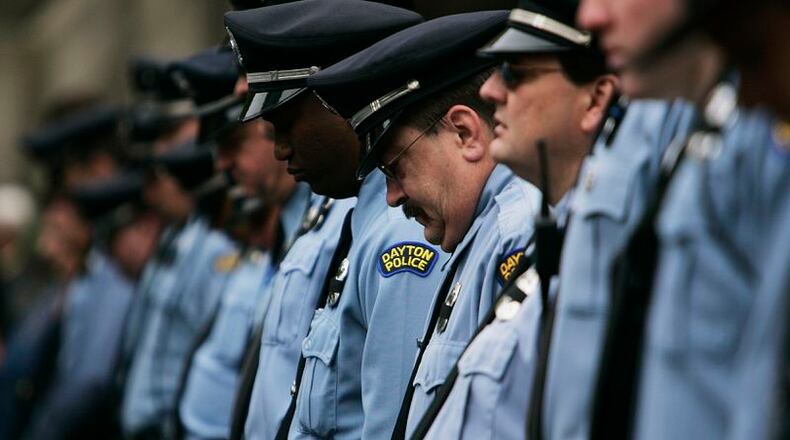A new committee focused on reforming police recruiting has started meeting, and one of its primary objectives is to increase the number of minorities who wear the badge in the city.
But some committee members recently said they expect this to be a very challenging task because even if every police recruit class from now on consisted entirely of minority candidates, it still would take many years ― possibly close to a decade ― to achieve the kinds of diversity numbers some people desire.
And recent police recruit classes, including one that begins Monday, have been overwhelmingly white.
But some committee members say they believe real change is possible that can improve diversity levels.
“My goal is to have our police department reflect the community,” said William Gillispie, a member of the recruitment committee and a former deputy city manager of Dayton. “If we are not committed to get it to that level, and we keep doing the same things we have always done, then we are wasting our time.”
Earlier this month, the working group focused on police recruitment in Dayton met electronically and discussed recruiting and hiring practices and trends.
It was the committee’s second meeting. The group is expected to meet regularly for many months to come.
There are five working groups focused on various areas of desired police reforms in Dayton, including use of force, training, oversight and community engagement.
The recruitment committee may need considerably more time than the other groups to develop and issue recommendations for reforms because of how difficult increasing police diversity has proven to be, said Dayton Mayor Nan Whaley, who is the committee’s co-lead.
Civil service staff and the police department have worked on the diversity issue for decades with minimal progress, she said. Other committees may start issuing some recommendations for reforms quickly, she previously said.
About 327 of the Dayton Police Department’s 362 uniformed personnel are white, according to city data.
Based on attrition models, the Dayton Police Department needs to hire about 20 new police officers each year, police officials said.
Even if all 20 new officers hired each year were members of minority groups, it still would take many years to achieve a level of diversity that mirrors the city’s population, officials said.
The 2020 police academy starts Monday, and 18 of the 21 recruits are white (85.7% of the total), city data show.
Last year, 94% of police recruits were white. In 2017, Dayton had its least diverse police recruit class in at least a decade (nearly 97% white).
2018 saw short-lived improvement: 68% of the police academy was white.
Gillispie, who worked for the city from 1971 to 2002, said he believes there is a real commitment by the city and its elected leadership to make meaningful changes in recruitment and hiring, and with the right recommendations, diversity numbers will improve.
He wants to see the share of people of color on the police force grow significantly in coming years, ideally with a goal of making the department’s diversity mirror the city’s by around 2030.
“That’s going to take some heavy lifting,” he said. “My approach, though we haven’t gotten to this in the group yet, is figuring out the obstacles to getting us there.”
Gillispie said his committee is just starting to get to work, but he already brought up one challenge, which is the length of time job candidates have to wait on list before getting an opportunity to join the police academy.
He said Black candidates especially don’t have the luxury to wait long periods of time for an employment opportunity.
“Our process for hiring and recruiting is much too cumbersome and much too long,” he said.
Dayton police Sgt. Joe Heyob, who is a recruitment committee member, also said the length and timing of the recruitment process is a challenge, because the police department is competing with other jurisdictions for candidates.
“We all know everybody has essentially the same goal,” he said. “The more we can have optimal timelines and streamline (the process) only is going to benefit us in the long run reaching those numbers.”
About the Author

